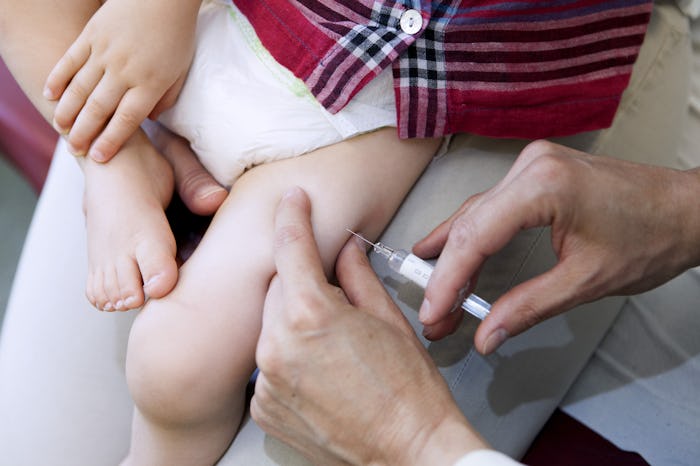Life
Here's How Many Kids Were Getting Vaccinated In The 90s Vs. Now
It's no secret that the anti-vaccination movement has seen plenty of growth recently. Many parents across the United States have latched onto the belief that vaccines are dangerous, despite mounting evidence to the contrary. Still, vaccines have saved countless lives over the years and looking at how vaccination rates in the '90s vs. now have evolved, it's clear that science has actually come a long way since then.
The Centers for Disease Control and Prevention releases a vaccination schedule each year for children and families to follow. In 2016, it was recommended that children receive a total of nine vaccines by the age of 6 months, with multiple doses being given each month. On the other hand, in 1995, only four different vaccines were required for children to get by the time they were 6 months old.
As of 2015, according to the CDC, 72.2 percent of children aged 19 to 35 months received these vital vaccines. In 1994, that number hovered around 69 percent for 4:3:1:3 series vaccines, which include DTP, polio, MMR, and Hib, according to Child Trends. The site explained:
Between 1994 and 2004, the proportion of children ages 19 to 35 months receiving the combined series (4:3:1:3) vaccines increased from 69 to 83 percent. Since that time, however, there has been no progress, with the 2013 rate at 82 percent.
As the New York State Department of Health notes, "As science and medicine continue to evolve, so does our ability — and public health responsibility — to prevent disease. The results of some of these advancements are new vaccines." And truly, these scientific advances are nothing short of extraordinary.
For example, it was only in 2006 when the HPV vaccine was implemented, and since then, rates of HPV infections in young girls have been significantly reduced. In 1953, the polio vaccine was discovered, nearly eradicating the disease. According to the CDC, "an average of 16,316 paralytic polio cases and 1879 deaths from polio were reported each year," before the vaccine was successfully implemented.
Clearly, vaccines are doing their job. But why do more of them scare some parents off?
Many parents may feel put off by the thought of injecting their precious children with so many needles and medicines, fearing they will overwhelm their immune system or that the side effects of some vaccines are worse than the actual disease. However, there have been numerous studies that show that vaccines do far more good than harm, and that they do not, contrary to many anti-vaxxers' popular opinions, cause autism, as the CDC has frequently reported.
Yes, children and babies are expected to get more vaccines now than they did in the '90s, but there's nothing wrong with that. If anything, it means the world is much healthier and has a chance to live longer. And by looking at numbers solely, it seems like parents acknowledge this. However, as CNN reported, "95% of children in kindergarten have had vaccines for preventable diseases, including two doses of the measles, mumps, and rubella (MMR) vaccine," adding, " but that figure is not spread evenly across the country."
This is because many states allow vaccine exemptions for religious or philosophical reasons, and as such, a lot of parents opt out. What's more, CNN also reported that "26 states have not reported meeting a government target of 95% coverage for MMR."
In 1990 and 1991, there was a terrible outbreak of the measles in the United States, and specifically, in New York City. However, that outbreak didn't last long. As BuzzFeed reported, "The epidemic in 1991 was eventually squashed thanks to massive efforts by federal and state health authorities to increase vaccine access to the poor." Now, though, high rates of measles outbreaks aren't due to a lack of access to vaccines — they're due to people opting out of vital vaccines, the majority of whom are wealthy, white, and privileged, according to CNN.
Back in the '90s, vaccines weren't nearly as evolved or as widely accessible as they are now. And rather than take advantage of these scientific advances that help kids stay healthy and keep others near them well, still too many people refuse to do so.
Watch Romper's new video series, Romper's Doula Diaries:
Check out the entire Romper's Doula Diaries series and other videos on Facebook and the Bustle app across Apple TV, Roku, and Amazon Fire TV.
